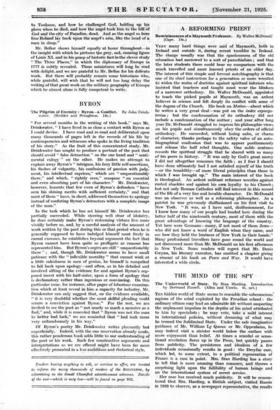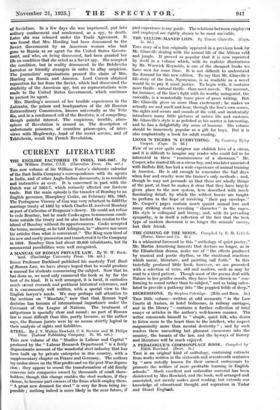THE MIND OF THE SPY
Tim hidden world of State seems to resemble the subconscious': regions of the mind exploited by the Freudian school : the ordinary citizen may lead an admirable life without suspecting the unpleasant impulses in the depths of his mind attributed to him by specialists ; he may vote, take a mild interest in international policies, without dreaming of what may be termed the Subliminal State. Under the safe imaginative guidance of Mr. William Ls Queux or Mr. Oppenheirn, he may indeed visit a sinister world below the surface with more enjoyment than belief. At times a scandal or sensa- tional revelation flares up in the Press, but quickly passes from publicity. The persistence and idealism of a few individuals occasionally results in good : the Dreyfus case, which led, to some extent, to a political regeneration of France is a case in point. Mrs. Stan Harding has a story to tell that is more amazing than romance, and throws a surprising light upon the fallibility of human beings and on the international system of secret service.
Her case has received much publicity. It will be remem- bered that Mrs. Harding, a British subject, visited Russia in 1920 to observe, as a newspaper representative, the results . . . of Sovietism. In a few days she was iniprisoned, put 146 solitary confinement and condemned, as a spy, - to death. Later she was released under the Trade Agreement. It was found that Mrs. Harding had been denounced to the Soviet Government by an American woman who had gone to Russia. as an agent for the United States Govern- ment, and who, on being discovered, had been granted her life on condition that she acted as a Soviet spy. She accepted the condition, but in reality denounced to the Bolsheviks harmless or friendly strangers in order to allay suspicion. The journalists' organizations pressed the claim of Mrs. Harding on Russia and America. Lord Curzon obtained reparation for her from the Soviet, which had discovered the duplicity of the American spy, but no representations were made to the United States Gcivernment, which' continues to protect its agent. Mrs. Harding's account of her terrible experiences in the Lubianka, the prison and .headquarters of the All Russian Extraordinary Commission, known universally as the Tchc Ka, and in a condemned cell of the Boutirka, is of compelling, though painful interest. The suspicious, terrible, atmo- sphere of Revolution is around us. The description of unfortunate prisoners, of countless prison-spies, of inter- views with eigogilewsky,head of the secret service, . and of Tchitcherin, recall the French Revolution.















































 Previous page
Previous page